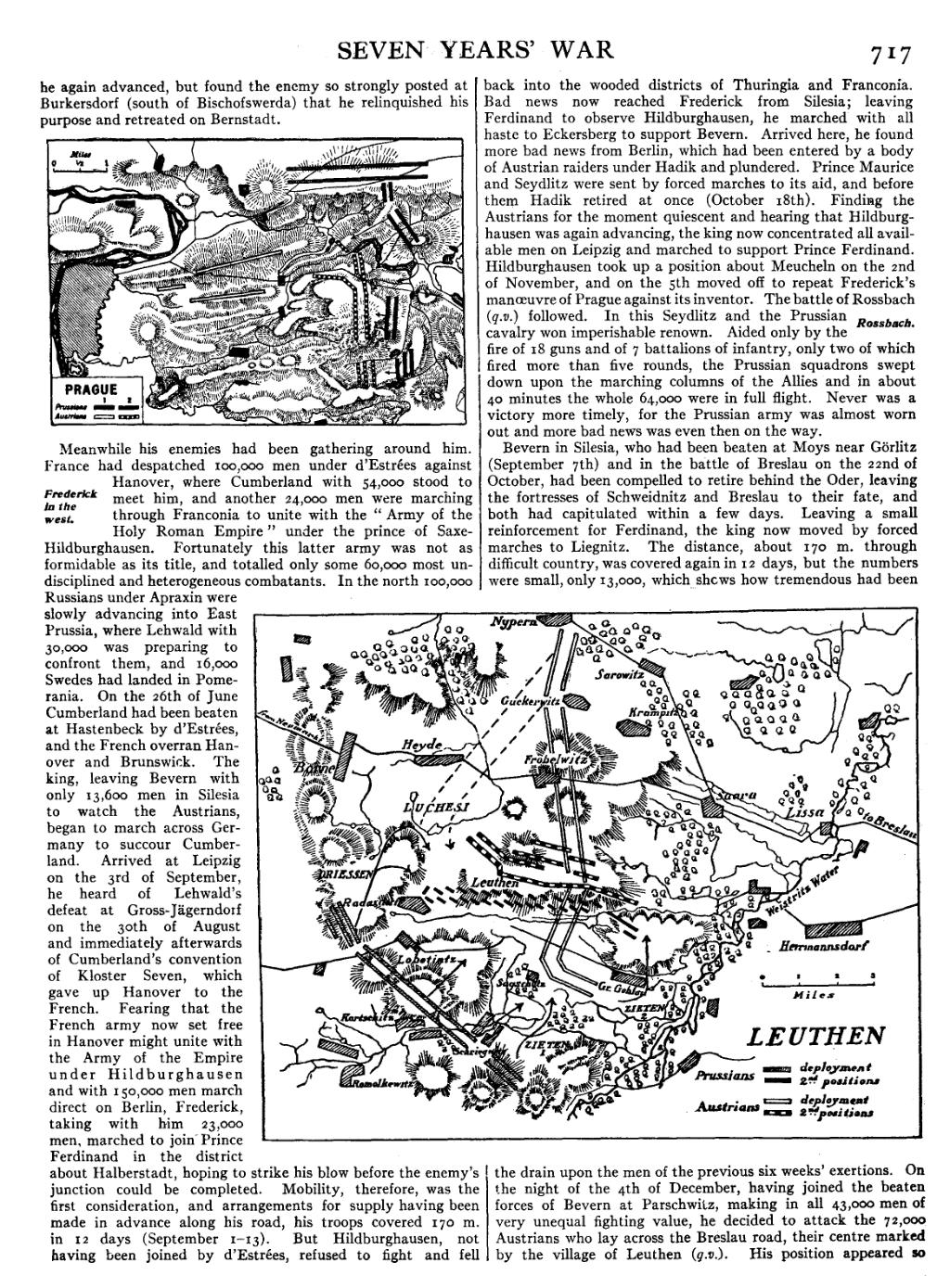he again advanced, but found the enemy so strongly posted at
Burkersdorf (south of Bischofswerda) that he relinquished his
purpose and retreated on Bernstadt.

Meanwhile his enemies had been gathering around him.
France had dispatched 100,000 men under d’Estrées against
Hanover, where Cumberland with 54,000 stood to
meet him, and another 24,000 men were marching
through Franconia to unite with the “Army of the
Holy Roman Empire” under the prince of Frederick
in the west.Saxe-Hildburghausen.
Fortunately this latter army was not as
formidable as its title, and totalled only some 60,000 most undisciplined
and heterogeneous combatants. In the north 100,000
Russians under Apraxin were
slowly advancing into East
Prussia, where Lehwald with
30,000 was preparing to
confront them, and 16,000
Swedes had landed in Pomerania.
On the 26th of June
Cumberland had been beaten
at Hastenbeck by d’Estrées,
and the French overran Hanover
and Brunswick. The
king, leaving Bevern with
only 13,600 men in Silesia
to watch the Austrians,
began to march across Germany
to succour Cumberland.
Arrived at Leipzig
on the 3rd of September,
he heard of Lehwald’s
defeat at Gross-Jägerndorf
on the 30th of August
and immediately afterwards
of Cumberland’s convention
of Kloster Seven, which
gave up Hanover to the
French. Fearing that the
French army now set free
in Hanover might unite with
the Army of the Empire under
Hildburghausen
and with 150,000 men march
direct on Berlin, Frederick,
taking with him 23,000
men, marched to join Prince
Ferdinand in the district
about Halberstadt, hoping to strike his blow before the enemy’s
junction could be completed. Mobility, therefore, was the
first consideration, and arrangements for supply having been
made in advance along his road, his troops covered 170 m.
in 12 days (September 1–13). But Hildburghausen, not
having been joined by d’Estrées, refused to fight and fell
back into the wooded districts of Thuringia and Franconia.
Bad news now reached Frederick from Silesia; leaving
Ferdinand to observe Hildburghausen, he marched with all
haste to Eckersberg to support Bevern. Arrived here, he found
more bad news from Berlin, which had been entered by a body
of Austrian raiders under Hadik and plundered. Prince Maurice
and Seydlitz were sent by forced marches to its aid, and before
them Hadik retired at once (October 18th). Finding the
Austrians for the moment quiescent and hearing that Hildburghausen
was again advancing, the king now concentrated all available
men on Leipzig and marched to support Prince Ferdinand.
Hildburghausen took up a position about Meucheln on the 2nd
of November, and on the 5th moved off to repeat Frederick’s
manœuvre of Prague against its inventor. The battle of Rossbach
(q.v.) followed. In this Seydlitz and the PrussianRossbach.
cavalry won imperishable renown. Aided only by the
fire of 18 guns and of 7 battalions of infantry, only two of which
fired more than five rounds, the Prussian squadrons swept
down upon the marching columns of the Allies and in about
40 minutes the whole 64,000 were in full flight. Never was a
victory more timely, for the Prussian army was almost worn
out and more bad news was even then on the way.

Bevern in Silesia, who had been beaten at Moys near Gorlitz (September 7th) and in the battle of Breslau on the 22nd of October, had been compelled to retire behind the Oder, leaving the fortresses of Schweidnitz and Breslau to their fate, and both had capitulated within a few days. Leaving a small reinforcement for Ferdinand, the king now moved by forced marches to Liegnitz. The distance, about 170 m. through difficult country, was covered again in 12 days, but the numbers were small, only 13,000, which shows how tremendous had been the drain upon the men of the previous six weeks’ exertions. On the night of the 4th of December, having joined the beaten forces of Bevern at Parschwitz, making in all 43,000 men of very unequal fighting value, he decided to attack the 72,000 Austrians who lay across the Breslau road, their centre marked by the village of Leuthen (q.v.). His position appeared so
